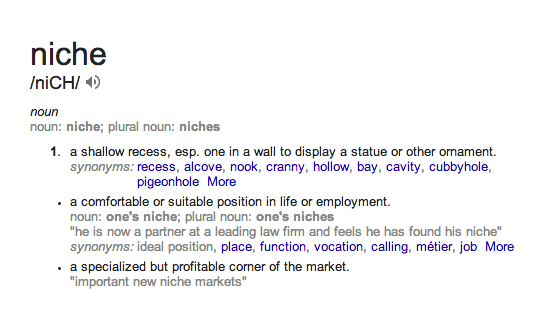Do You Need to Choose a Niche?
As a freelancer, choosing a clearly defined niche has a range of benefits. It simplifies your marketing and gives you the option of targeting more lucrative projects.
On the other hand, being told you must choose a niche when you start your freelance career can be paralyzing. Without experience, it's difficult to know which services you'll be best at or which clients you'll most enjoy working with.
Do you really need to choose a niche? Let's take a look at the pros and cons, so you can decide for yourself.
What Is a Niche?
"Niche" has a few different meanings.

According to some language historians, the word was coined in Renaissance Italy, where it was used to describe the recesses in ornate buildings. These niches were used by sculptors such as Michaelangelo to display their best work.
These days, we say that people have "found their niche" when they've found work they're good at and that they enjoy.
In business terms, a niche market is the subset of a broader market. For example, if you set up a business selling red pencils, you'd be targeting a niche market within the broader market of pencils. In turn, pencils is a niche market within the broader market of stationery.
What does this mean for freelancers? Having a niche:
- Gives you the opportunity to produce and display your best work.
- Is about being good at and enjoying what you do.
- Allows you to target a specific market.
For a freelance web designer, a niche could be: only creating websites for restaurants; or only working with clients in a specific area; or building all your sites with a specific framework; or all three of these combined. For a freelance writer, a niche could be only writing about a specific topic; or focusing on a specific form of writing, such as blogging or press releases; or only working with clients in a specific industry; or all three of these combined.
The Pros of Choosing a Niche
Choosing a niche for your freelance business has three advantages.
First, choosing a niche makes marketing easier. Instead of having to explain the wide range of services you offer or going out searching for "anyone who wants to hire a designer," your marketing is focused and has a clear message. This makes it easier for clients looking for your specific services to hire you and easier to convince clients that you're the right person for their project.
On top of that, because you've chosen a niche, you will stand out from all the generalists in your field. Copywriter Pam Foster explains that choosing a niche for her services significantly increased enquiries. Foster writes:
"Once I focused on my niche market (the pet industry), I was being found and approached by marketers from fantastic companies I didn’t even know existed. No more hunting for good prospects … they find ME."
Second, choosing a niche establishes you as a specialist. You become the go-to expert in your field. You'll find it easier to get speaking engagements and writing commissions that act as soft promotions for your business. Developing your expertise is also personally rewarding as you learn everything there is to know in your field.
Finally, having an established niche allows you to raise your rates. You're the expert in your field, and clients will expect to pay a premium for your knowledge and experience.
So, Why Wouldn't You Choose a Niche?
The truth is that while selecting a niche has a number of benefits, you don't need one to run a successful freelance business. There are a few reasons to hold back on choosing a niche.
- You enjoy the challenge of working with different clients. This is likely to be you if you think variety is the spice of life. In this case, you're a generalist, and that's great! Also, you'll be grateful that every day is different, so your work never becomes mundane.
- You've developed a broad skill-set. Again, this is a sign that you're a generalist. You'll have more to offer your clients than a specialist, which many clients will appreciate.
- You're just starting out. While you're developing your freelance business, you're still learning about your strengths and the work you most enjoy.
In your first few months of freelancing, I recommend you don't choose a niche. Instead, be open to any work that comes your way. You'll learn about what you're best at and the types of work you enjoy most.
Once you've worked with a few different clients, you might decide you prefer working on a particular type of project, or you may choose to be a generalist.
You may find it takes years to discover your niche. If this is you, you might never deliberately decide on a niche but simply find that particular types of clientele gravitate towards your business. In other words, your niche chooses you.
Don't stress about finding a niche. If there's one for you, you'll find it. And if you don't, then you can rest in the knowledge that you're a generalist, with all the rewards that brings.
comments powered by Disqus


